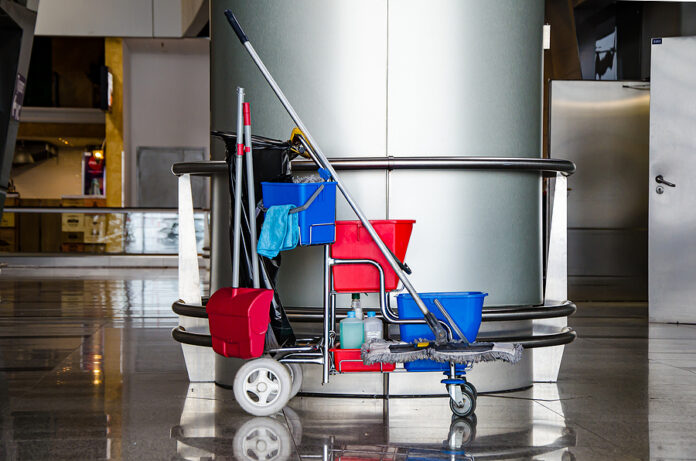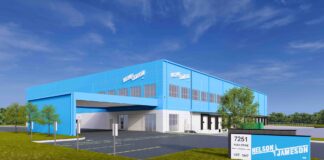
By Matthew Baratta, Vice President of Operations at Daimer Industries
The food industry is among the most regulated industries regarding sanitation and cleanliness compliance. The USDA has mandated particular requirements for food production establishments in their Sanitation Performance Standards Compliance Guide. We recommend checking out this guide to get a complete picture of the requirements for your specific facility. Managing food industry cleaning operations can feel daunting between the guidelines for operating procedures, employee hygiene, different cleaning compounds used, and more. That’s where choosing the right cleaning equipment comes in.
Whether you are part of a large, nationwide food producer or a smaller, local service, effective cleaning equipment is your key to maintaining sanitization compliance throughout your supply chain. Luckily, many options are available to help ensure you keep up with compliance guidelines most efficiently and cost-effectively as possible.
Non-industrial essentials
If you have any non-industrial sections of your facility, such as a storefront or employee breakroom, you likely won’t always want to pull out industrial-grade equipment to deal with light messes. Non-industrial essentials are ideal for the daily cleaning you need, bringing in the industrial equipment for your deep cleans. These are the non-industrial cleaning essentials most important to have on hand.
Cloths and sponges
When it’s the middle of a busy production day, you don’t always have time to run and grab the entire cleaning cart — that’s why keeping cloths on hand all around your facility is essential. They are versatile, aiding in many cleaning tasks, from wiping down belts, tables, and filters to other production surfaces. The best option for many is going to be microfiber cloths, as these are exceptionally efficient in attracting and holding dust, dirt, and bacteria.
Floor cleaning equipment
Even though the floor is not a food-contact surface, it’s important to frequently clean it to ensure it doesn’t become a contamination or health hazard. A contractor’s broom and dustpan will help you clear the floor of general debris and dirt, as these are explicitly built for facility maintenance. For spills and general stickiness, a mop is another essential — quick-change spin mops are efficient for cleaning and swapping out the heads quickly.
Scrub brushes and pads
As any facility manager knows, food residue and grime can build up quickly. Scrub brushes and pads are heavier duty than simple cloths and sponges and are perfect for quickly loosening those caked-over spots on your equipment. Open up with a stiff scrub brush, and sanitize appropriately with the right chemicals and cloths.
Sanitizing chemicals
There is a myriad of sanitization and cleaning chemicals out there; however, they aren’t all made equal. When you’re trying to decide which sprays to use in your cleaning process, there are certain labels you can watch for to ensure that the product you choose is up to USDA standards. Disinfectants should be used in food processing facilities to eliminate potentially dangerous contaminants. However, you should always clean and sanitize with industrial-grade cleaners before disinfection since dirt impairs the capacity of chemicals to kill bacteria. Whatever spray or chemical you use, ensure you follow the manufacturer’s instructions for maximum effectiveness.
Industrial equipment essentials
While having non-industrial cleaning equipment around for general maintenance is important, investing in the right industrial cleaning equipment is the only way to thoroughly meet USDA cleaning standards. However, how can you decide which type of equipment is necessary for your facility? Focus on these essential pieces of equipment to ensure all your bases are covered.
Hot water / wet steam pressure washers
Hot water pressure washers are essential cleaning tools in food processing plants because they effectively remove stubborn grime, grease, and residue from machinery, surfaces, and floors. Regular cleaning products and methods simply can’t tackle contaminants as effectively as hot water power washers. In food processing, equipment and surfaces can accumulate hardened or baked-on residues that harbor harmful bacteria or pathogens. By effectively removing these, pressure washers help ensure a sanitary production environment and minimize contamination risks.
Industrial vacuums
Dust buildup can be a real issue for food industry facilities because many areas can go unnoticed during cleaning. Dust build-up can lead to your equipment operating at a lower capacity than you need and potentially health and safety issues as well. That’s where industrial-grade vacuum cleaners (preferably with proper HEPA filtration) really come in handy. Make a list of the areas around your facility that receive less attention when cleaning, and run over them with an industrial vacuum cleaner to take care of dust and debris collecting.
Steam cleaners
Steam cleaners are essential for USDA sanitization compliance for food facilities. Because it is safer and more environmentally friendly than harsh chemicals, high-temperature and pressure steam cleaning has essentially replaced chemical sanitization as the primary technique for cleaning extensive areas in food facilities. Steam cleaners can achieve high temperatures to kill bacteria without using environmentally-damaging sanitization chemicals. There are many steam cleaner options out there that can help you achieve a cleaner environment in your facility.
Personal protective equipment
All the cleaning equipment listed above will help keep your facility clean and safe from cross-contamination, but be sure to prioritize personal safety through this process. When using cleaning equipment, especially anything involving chemicals, use personal protective equipment like gloves and a mask to avoid injury.
Anyone with experience in the food production industry knows the challenges of keeping a facility clean and compliant. It isn’t an easy job, but the right equipment will make it significantly more efficient and easier to manage. Investing in the right equipment can better manage the entire cleaning process and ensure safety and compliance throughout your entire facility, an essential baseline for longevity in this industry.
Matthew Baratta is Vice President of Operations at Daimer Industries®, a leader in innovative, technologically advanced commercial and industrial cleaning equipment for major commercial and industrial cleaning and restoration applications. Baratta has extensive cleaning industry knowledge and earned a master’s degree in Public Health.







